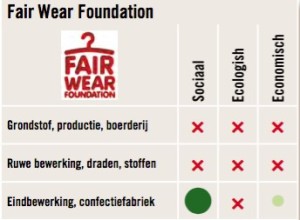When I founded goodmapp, from the very beginning it was clear to me that it was not supposed to become another label or certification, with so many already out there. Goodmapp’s mission was supposed, and still is, to give us the chance to use our voices. What do we consider to be fair and sustainable?
Coming across an article from the the Guardian, asking whether we as consumers understand what’s behind a certification label and if it actually mattered if we do, I together with Yvette Ramakers, a starting social entrepreneur, explored the maze of labels and certificates. Was it justified of me to be skeptical?
Divided into three parts, this first part will take a look from an entrepreneurial point of view. It’s the story of Yvette Ramakers when starting her company in the (organic) textile industry. What does it mean for a starting social enterprise to receive a certification and why would an enterprise want one?
On October 3rd 2016, Yvette Ramakers registered her first company named Binki. “After working as a consultant for more than 8 years, working in a great team and earning a good salary I got the feeling that I was missing something. I know it probably sounds corny, but I want to do more to make the world a better place. Not knowing at first how to do this, I got inspired by companies like TOMS, Waka Waka and Fairphone. I decided to start a business and help the world at the same time. After a lot of thinking I was drawn to baby- and children’s clothing and that was the start of Binki. There are many improvements to be made in the textile industry as far as working conditions and environmental impact concerns. With Binki I want to improve these aspects and at the same time help the most vulnerable among us, babies and children in need. Binki will contribute part of its profits to a yet to be determined cause.”
“For me it is vitally important that Binki products are made under safe, fair and hygienic circumstances. Binki will not make use of any child labor and strives for a minimal impact on the environment. These conditions seemed so logical to me when I was coming up with my business idea. Reading more and more into the industry it became apparent that (of course) not everything is black and white and some things are more difficult to realize. I started my search for an all-encompassing certificate that could guarantee that all my conditions would be met. An extensive google search gave me some fairly good results. The website www.goedewaar.nl performed a research on several certificates in October 2012. Given this research the GOTS certificate seems the best fit to my needs. The certificates Fair Wear Foundation and Fairtrade can be complementary and together make the production process fit to my prefered situation. Additional research and website confirmed these results.”



“Certificates sometimes receive criticism but the advantage of using them is that they can provide a solid starting point for finding initial suppliers. They check many technical aspects that I am not in detail familiar with, they have knowledge of local legislation and are able to check the working conditions and employee agreements in the local language. At this point I am still getting myself familiar with the standards of the various certificates and learn more about what they actually entail. Reading through the actual standards raises some questions which I will have to address with the certification bodies or suppliers. There are concrete aspects to the standards, but also grey areas. For example:
- “Appropriate personal protective equipment must be provided to the workers” – What can be seen as appropriate? This is ambiguous.
- “There must be no new recruitment of child labor.” – This means that children already working there will be able to continue to work.
Given the fact that the certifications will provide a good starting point for choosing a supplier, I will visit the production facility and see the conditions and working methods first hand. I want to know who is working for me, it improves communication and will result in a better working relationship. You might be wondering why I would want to produce my products in areas where this could be a problem at all? Well, for me there are a couple of reasons. I prefer Binki products to be made of organic cotton. This is mainly grown in India with 74% of the world’s production, followed by China and Turkey (2014 Organic Market Report from Textile Exchange). The harvesting process is part of the process that is certified. Production could be done in other parts of the world, but these countries can produce good quality products, it prevents additional transport and it provides opportunities for the local community. Opportunities for better working conditions, better salary, and better secondary benefits. If more and more suppliers will work according to the standards of certificating bodies, in time it might even change local standards and more people and the environment will benefit.
The initial focus of Binki will be to produce cool, comfortable and fun baby- and children’s clothes, in time the product range might expand. Binki strives to make the world a better place and will continuously increase its positive impact!”
Want to know more about Binki and follow its progress? Soon you can check the website http://www.binki.org for more information.
Next time a different point of view will be explored: why a social enterprise (perhaps) does not want to have a certification. The third blog will take it more from a consumer’s perspective.